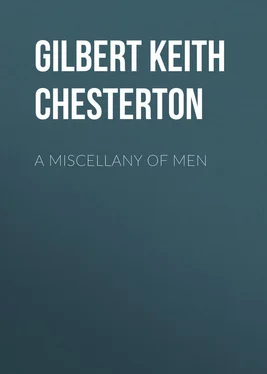Gilbert Chesterton - A Miscellany of Men
Здесь есть возможность читать онлайн «Gilbert Chesterton - A Miscellany of Men» — ознакомительный отрывок электронной книги совершенно бесплатно, а после прочтения отрывка купить полную версию. В некоторых случаях можно слушать аудио, скачать через торрент в формате fb2 и присутствует краткое содержание. Жанр: foreign_antique, foreign_prose, на английском языке. Описание произведения, (предисловие) а так же отзывы посетителей доступны на портале библиотеки ЛибКат.
- Название:A Miscellany of Men
- Автор:
- Жанр:
- Год:неизвестен
- ISBN:нет данных
- Рейтинг книги:4 / 5. Голосов: 1
-
Избранное:Добавить в избранное
- Отзывы:
-
Ваша оценка:
- 80
- 1
- 2
- 3
- 4
- 5
A Miscellany of Men: краткое содержание, описание и аннотация
Предлагаем к чтению аннотацию, описание, краткое содержание или предисловие (зависит от того, что написал сам автор книги «A Miscellany of Men»). Если вы не нашли необходимую информацию о книге — напишите в комментариях, мы постараемся отыскать её.
A Miscellany of Men — читать онлайн ознакомительный отрывок
Ниже представлен текст книги, разбитый по страницам. Система сохранения места последней прочитанной страницы, позволяет с удобством читать онлайн бесплатно книгу «A Miscellany of Men», без необходимости каждый раз заново искать на чём Вы остановились. Поставьте закладку, и сможете в любой момент перейти на страницу, на которой закончили чтение.
Интервал:
Закладка:
Now all this may sound very fanciful and mystical, but it is the right view of pokers, and no one who takes it will ever go in for any wrong view of pokers, such as using them to beat one’s wife or torture one’s children, or even (though that is more excusable) to make a policeman jump, as the clown does in the pantomime. He who has thus gone back to the beginning, and seen everything as quaint and new, will always see things in their right order, the one depending on the other in degree of purpose and importance: the poker for the fire and the fire for the man and the man for the glory of God.
This is thinking forwards. Now our modern discussions about everything, Imperialism, Socialism, or Votes for Women, are all entangled in an opposite train of thought, which runs as follows: – A modern intellectual comes in and sees a poker. He is a positivist; he will not begin with any dogmas about the nature of man, or any day-dreams about the mystery of fire. He will begin with what he can see, the poker; and the first thing he sees about the poker is that it is crooked. He says, “Poor poker; it’s crooked.” Then he asks how it came to be crooked; and is told that there is a thing in the world (with which his temperament has hitherto left him unacquainted) – a thing called fire. He points out, very kindly and clearly, how silly it is of people, if they want a straight poker, to put it into a chemical combustion which will very probably heat and warp it. “Let us abolish fire,” he says, “and then we shall have perfectly straight pokers. Why should you want a fire at all?” They explain to him that a creature called Man wants a fire, because he has no fur or feathers. He gazes dreamily at the embers for a few seconds, and then shakes his head. “I doubt if such an animal is worth preserving,” he says. “He must eventually go under in the cosmic struggle when pitted against well-armoured and warmly protected species, who have wings and trunks and spires and scales and horns and shaggy hair. If Man cannot live without these luxuries, you had better abolish Man.” At this point, as a rule, the crowd is convinced; it heaves up all its clubs and axes, and abolishes him. At least, one of him.
Before we begin discussing our various new plans for the people’s welfare, let us make a kind of agreement that we will argue in a straightforward way, and not in a tail-foremost way. The typical modern movements may be right; but let them be defended because they are right, not because they are typical modern movements. Let us begin with the actual woman or man in the street, who is cold; like mankind before the finding of fire. Do not let us begin with the end of the last red-hot discussion – like the end of a red hot poker. Imperialism may be right. But if it is right, it is right because England has some divine authority like Israel, or some human authority like Rome; not because we have saddled ourselves with South Africa, and don’t know how to get rid of it. Socialism may be true. But if it is true, it is true because the tribe or the city can really declare all land to be common land, not because Harrod’s Stores exist and the commonwealth must copy them. Female suffrage may be just. But if it is just, it is just because women are women, not because women are sweated workers and white slaves and all sorts of things that they ought never to have been. Let not the Imperialist accept a colony because it is there, nor the Suffragist seize a vote because it is lying about, nor the Socialist buy up an industry merely because it is for sale.
Let us ask ourselves first what we really do want, not what recent legal decisions have told us to want, or recent logical philosophies proved that we must want, or recent social prophecies predicted that we shall some day want. If there must be a British Empire, let it be British, and not, in mere panic, American or Prussian. If there ought to be female suffrage, let it be female, and not a mere imitation as coarse as the male blackguard or as dull as the male clerk. If there is to be Socialism, let it be social; that is, as different as possible from all the big commercial departments of to-day. The really good journeyman tailor does not cut his coat according to his cloth; he asks for more cloth. The really practical statesman does not fit himself to existing conditions, he denounces the conditions as unfit. History is like some deeply planted tree which, though gigantic in girth, tapers away at last into tiny twigs; and we are in the topmost branches. Each of us is trying to bend the tree by a twig: to alter England through a distant colony, or to capture the State through a small State department, or to destroy all voting through a vote. In all such bewilderment he is wise who resists this temptation of trivial triumph or surrender, and happy (in an echo of the Roman poet) who remembers the roots of things.
THE NAMELESS MAN
There are only two forms of government the monarchy or personal government, and the republic or impersonal government. England is not a government; England is an anarchy, because there are so many kings. But there is one real advantage (among many real disadvantages) in the method of abstract democracy, and that is this: that under impersonal government politics are so much more personal. In France and America, where the State is an abstraction, political argument is quite full of human details – some might even say of inhuman details. But in England, precisely because we are ruled by personages, these personages do not permit personalities. In England names are honoured, and therefore names are suppressed. But in the republics, in France especially, a man can put his enemies’ names into his article and his own name at the end of it.
This is the essential condition of such candour. If we merely made our anonymous articles more violent, we should be baser than we are now. We should only be arming masked men with daggers instead of cudgels. And I, for one, have always believed in the more general signing of articles, and have signed my own articles on many occasions when, heaven knows, I had little reason to be vain of them. I have heard many arguments for anonymity; but they all seem to amount to the statement that anonymity is safe, which is just what I complain of. In matters of truth the fact that you don’t want to publish something is, nine times out of ten, a proof that you ought to publish it.
But there is one answer to my perpetual plea for a man putting his name to his writing. There is one answer, and there is only one answer, and it is never given. It is that in the modern complexity very often a man’s name is almost as false as his pseudonym. The prominent person today is eternally trying to lose a name, and to get a title. For instance, we all read with earnestness and patience the pages of the ‘Daily Mail’, and there are times when we feel moved to cry, “Bring to us the man who thought these strange thoughts! Pursue him, capture him, take great care of him. Bring him back to us tenderly, like some precious bale of silk, that we may look upon the face of the man who desires such things to be printed. Let us know his name; his social and medical pedigree.” But in the modern muddle (it might be said) how little should we gain if those frankly fatuous sheets were indeed subscribed by the man who had inspired them. Suppose that after every article stating that the Premier is a piratical Socialist there were printed the simple word “Northcliffe.” What does that simple word suggest to the simple soul? To my simple soul (uninstructed otherwise) it suggests a lofty and lonely crag somewhere in the wintry seas towards the Orkheys or Norway; and barely clinging to the top of this crag the fortress of some forgotten chieftain. As it happens, of course, I know that the word does not mean this; it means another Fleet Street journalist like myself or only different from myself in so far as he has sought to secure money while I have sought to secure a jolly time.
Читать дальшеИнтервал:
Закладка:
Похожие книги на «A Miscellany of Men»
Представляем Вашему вниманию похожие книги на «A Miscellany of Men» списком для выбора. Мы отобрали схожую по названию и смыслу литературу в надежде предоставить читателям больше вариантов отыскать новые, интересные, ещё непрочитанные произведения.
Обсуждение, отзывы о книге «A Miscellany of Men» и просто собственные мнения читателей. Оставьте ваши комментарии, напишите, что Вы думаете о произведении, его смысле или главных героях. Укажите что конкретно понравилось, а что нет, и почему Вы так считаете.








